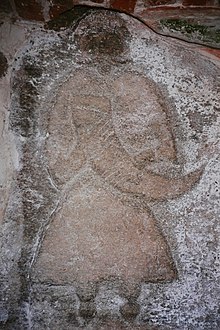 Global Information
Global InformationSlavic paganism information

Slavic mythology or Slavic paganism is the religious beliefs, myths, and ritual practices of the Slavs before Christianisation, which occurred at various stages between the 8th and the 13th century.[1]
The South Slavs, who likely settled in the Balkans during the 6th–7th centuries AD,[2] bordering with the Byzantine Empire to the south, came under the sphere of influence of Eastern Christianity relatively early, beginning with the creation of writing systems for Slavic languages (first Glagolitic, and then Cyrillic script) in 855 by the brothers Saints Cyril and Methodius and the adoption of Christianity in Bulgaria in 864 and 863 in Great Moravia. The East Slavs followed with the official adoption in 988 by Vladimir the Great of Kievan Rus'.[3]
The West Slavs' process of Christianisation was more gradual and complicated compared to their Eastern counterparts. The Moravians accepted Christianity as early as 831, the Bohemian dukes followed in 845, and the Slovaks accepted Christianity somewhere between the years 828 and 863,[4] but the first historical Polish ruler (Mieszko I) accepted it much later, in 966, around the same time as the Sorbs, while the Polabian Slavs only came under the significant influence of the Catholic Church from the 12th century onwards. For the Polabian Slavs and the Sorbs, Christianisation went hand in hand with full or partial Germanisation.[5]
The Christianisation of the Slavic peoples was, however, a slow and—in many cases—superficial phenomenon, especially in what is today Russia. It was vigorous in western and central parts of what is today Ukraine, since they were closer to the capital, Kiev. Even there, however, popular resistance led by volkhvs, pagan priests or shamans, recurred periodically for centuries.[3] Popular resistance to Christianity was also widespread in early Poland, culminating in the Pagan reaction.
The West Slavs of the Baltic tenaciously withstood Christianity until it was violently imposed on them through the Northern Crusades.[5] Among Poles and East Slavs, rebellions broke out throughout the 11th century.[1] Christian chroniclers reported that the Slavs regularly re-embraced their original religion (relapsi sunt denuo ad paganismus).[6]
Many elements of the Slavic indigenous religion were officially incorporated into Slavic Christianity (which manifested itself in the architecture of the Russian Church, icon painting, etc.),[3] and the worship of Slavic gods has persisted in unofficial folk religion until modern times.[7] The Slavs' resistance to Christianity gave rise to a "whimsical syncretism", which was called dvoeverie, "double faith", in Old Church Slavonic.[1] Since the early 20th century, Slavic folk religion has undergone an organised reinvention and reincorporation in the movement of Slavic Native Faith (Rodnovery).
- ^ a b c Jakobson 1985, p. 3.
- ^ Fine 1991, pp. 26–41.
- ^ a b c Ivakhiv 2005, p. 214.
- ^ "Saints Cyril and Methodius Patrons of Europe. The Earliest Evidence of Christianity in Slovakia".
- ^ a b Pettazzoni 1967, p. 154.
- ^ Radovanovič, Bojana (2013). "The Typology of Slavic Settlements in Central Europe in the Middle Ages". In Rudić, Srđan (ed.). The World of the Slavs: Studies of the East, West and South Slavs: Civitas, Oppidas, Villas and Archeological Evidence (7th to 11th Centuries CE). Belgrade, Serbia: Historical Institute (Istorijski institut). ISBN 9788677431044. p. 367.
- ^ Ivanits 1989, pp. 15–16; Rudy 1985, p. 9; Gasparini 2013.